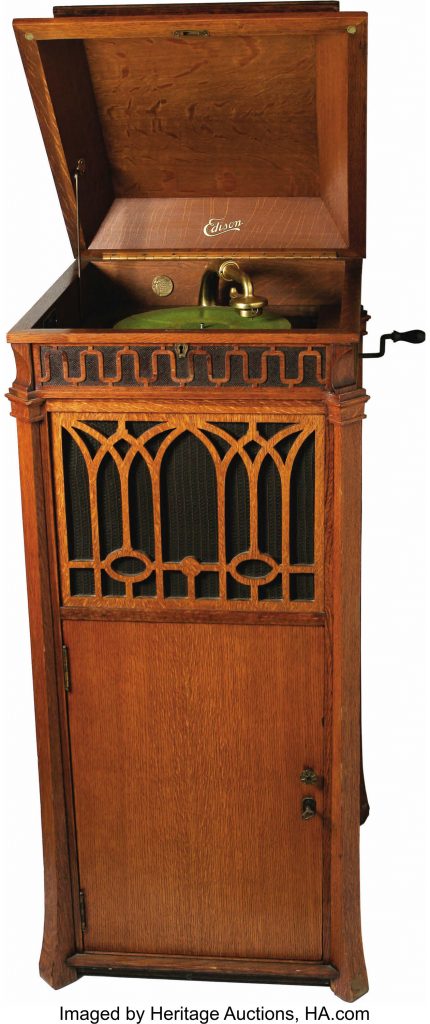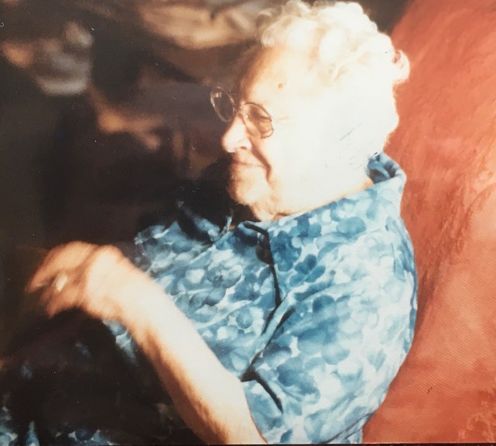Grooving with Aunt Gert


Professor Joe Goldblatt
“Never tell Uncle Ben!” Suddenly and without warning Aunt Gert had placed her massive flour covered hand upon my lips to insure our deep, dark secret would never be revealed. A few minutes earlier, my seven year old self had been exploring Aunt Gert Whitby’s old farm house when I discovered a new treasure that became a lifelong secret, that until now was only shared between the two of us.
Towering over me was a tall dark brown cabinet with music emitting from behind a front cloth cover. Slowly the music began to fade and finally stop and I noticed a crank on the right side of this strange machine and my small hand reached up to begin to wind it up again. After a few cranks the music began once more and my childhood curiosity led me to find the source of the sweet sounds. I carefully removed the front cover and discovered a giant metal horn producing these beautiful sounds. And in the middle of the horn, having been carefully hidden by the screen, was a half empty bottle of Gin.
I removed the Gin bottle and ran into Aunt Gert’s large messy kitchen to share my treasure and that is when we shared this deep dark secret and I was strongly warned not to tell Aunt Gert’s husband, Uncle Ben. However, we shared more than the secret of her occasional nips of Gin, we began to share what became for me a life – long love of long playing record albums.
Aunt Gert had grown up in the middle of Texas on a small farm. Her father was Jewish and although she lived no where near a Jewish synagogue, her family’s Edison phonograph, the same one I discovered in her home, played Jewish music and especially during festivals and holidays this musicprovided cultural sustenance and brought her faith the life in her rural home.
It has been reported in this publication and others that the sales of long playing record albums have increased dramatically in recent years. Despite the evolution of music technology that has transitioned from records to cassette tapes, compact discs (CD) to now digital downloads, the long playing record album continues to have an even much longer life.
In my home, I have a collection of dozens of albums ranging from jazz to original cast recordings of West End musicals and also including spoken word treasures such as the American poet Carl Sandburg sonorously reading the speeches of President Abraham Lincoln. Each time my phonograph stylus needs gently lands in the groove of each album I feel a warmth, depth and emotion that I do not experience from a cold, crisp and clear CD or a digital download.
Unlike digital downloads, one of the great pleasures of listening to albums is that this may be an intimately shared experience. I love looking across my lounge and seeing a smile form upon the lips of my wife or friends when I introduce them to a new artist whose music pours forth from my phonograph. The original phonograph (derived from the greek words meaning “sound writing”) was invented by the American Thomas Alva Edison on 12 August 1877 (now celebrated annually as National Vinyl Records Day). A few years later many great improvements were made by the Scotsman Alexander Graham Bell when he introduced his new gramophone.
I suppose my greatest pleasure from listening to an older record album is the actual scratchiness and occasional skipping fault that randomly occurs. To me this demonstrates experience, maturity, and age and despite the annoyance of having to get up and move the stylus forward, I take pleasure in helping this old friend continue to spin out beautiful music for me and others to enjoy. I suppose old record albums are in some form also symbolic of folk of my generation who occassionally need a little extra help to spin out the beautiful music that is still within us.
When Aunt Gert died at 92, my mother telephoned to let me know that I would be receiving a gift from her estate. A few days later a large moving van arrived at my home and the driver wheeled into my house a large wooden crate, I then carefully used a screwdriver to remove the dozens of screws that reavealed that inside was the very Edison phonograph that I had first discovered in Aunt Gert’s home many decades earlier.
I immediately searched through the records and found the dusty old copy of “Kol Nidre” which is the traditional hymn sung by Jewish people on Yom Kippur, when we atone for our sins. As I listened to this recording, I thought of Aunt Gert as a Jewish girl, living on a farm, and annually keeping her faith through this beautiful piece of music.
When the recording finished, I replaced the stylus upon its perch and then went directly to the kitchen cabinet and removed a bottle of Gin and transported it to the horn within the Edison. I placed it there in eternal memory of the secret that Aunt Gert and I shared that resulted in a life long love of good music spun forth from a deep groove and filling a room and lifetime with beautiful music.
Professor Joe Goldblatt is Emeritus Professor of Planned Events at Queen Margaret University and collects long playing albums. To learn more about his love of music and other views visit www.joegoldblatt.scot
